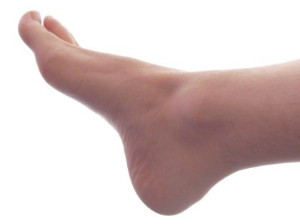 If you sweat often, even in circumstances where it isn’t necessarily hot or you aren’t physically active, you may have hyperhidrosis. It is estimated that around three percent of the U.S. population suffers from hyperhidrosis. While usually not a major health concern, it can generate discomfort and feelings of embarrassment and anxiety. Hyperhidrosis can affect the entire body, but it is very common to experience symptoms on the feet. Palmoplantar hyperhidrosis is the term used to denote hyperhidrosis that is localized in the hands and feet. The primary symptom of hyperhidrosis is excessive sweating that occurs frequently. Infections and skin irritation may occur from all the sweating as well. Many who experience hyperhidrosis also feel self-conscious and anxious due to all the sweating and look for any way to prevent it. Over-the-counter treatment options for hyperhidrosis mostly include antiperspirants. If your feet sweat heavily and frequently, it is recommended to see a podiatrist who can prescribe a stronger antiperspirant or another treatment for hyperhidrosis.
If you sweat often, even in circumstances where it isn’t necessarily hot or you aren’t physically active, you may have hyperhidrosis. It is estimated that around three percent of the U.S. population suffers from hyperhidrosis. While usually not a major health concern, it can generate discomfort and feelings of embarrassment and anxiety. Hyperhidrosis can affect the entire body, but it is very common to experience symptoms on the feet. Palmoplantar hyperhidrosis is the term used to denote hyperhidrosis that is localized in the hands and feet. The primary symptom of hyperhidrosis is excessive sweating that occurs frequently. Infections and skin irritation may occur from all the sweating as well. Many who experience hyperhidrosis also feel self-conscious and anxious due to all the sweating and look for any way to prevent it. Over-the-counter treatment options for hyperhidrosis mostly include antiperspirants. If your feet sweat heavily and frequently, it is recommended to see a podiatrist who can prescribe a stronger antiperspirant or another treatment for hyperhidrosis.
If you are suffering from hyperhidrosis contact Raul Hidalgo DPM of South Texas Foot & Ankle Care. Our doctor can provide the care you need to attend to all of your foot and ankle needs.
Hyperhidrosis of the Feet
Hyperhidrosis is a rare disorder that can cause people to have excessive sweating of their feet. This can usually occur all on its own without rigorous activity involved. People who suffer from hyperhidrosis may also experience sweaty palms.
Although it is said that sweating is a healthy process meant to cool down the body temperature and to maintain a proper internal temperature, hyperhidrosis may prove to be a huge hindrance on a person’s everyday life.
Plantar hyperhidrosis is considered to be the main form of hyperhidrosis. Secondary hyperhidrosis can refer to sweating that occurs in areas other than the feet or hands and armpits. Often this may be a sign of it being related to another medical condition such as menopause, hyperthyroidism and even Parkinson’s disease.
In order to alleviate this condition, it is important to see your doctor so that they may prescribe the necessary medications so that you can begin to live a normal life again. If this is left untreated, it is said that it will persist throughout an individual’s life.
A last resort approach would be surgery, but it is best to speak with your doctor to find out what may be the best treatment for you.
If you have any questions please feel free to contact our office located in San Antonio, TX . We offer the newest diagnostic and treatment technologies for all your foot and ankle needs.
